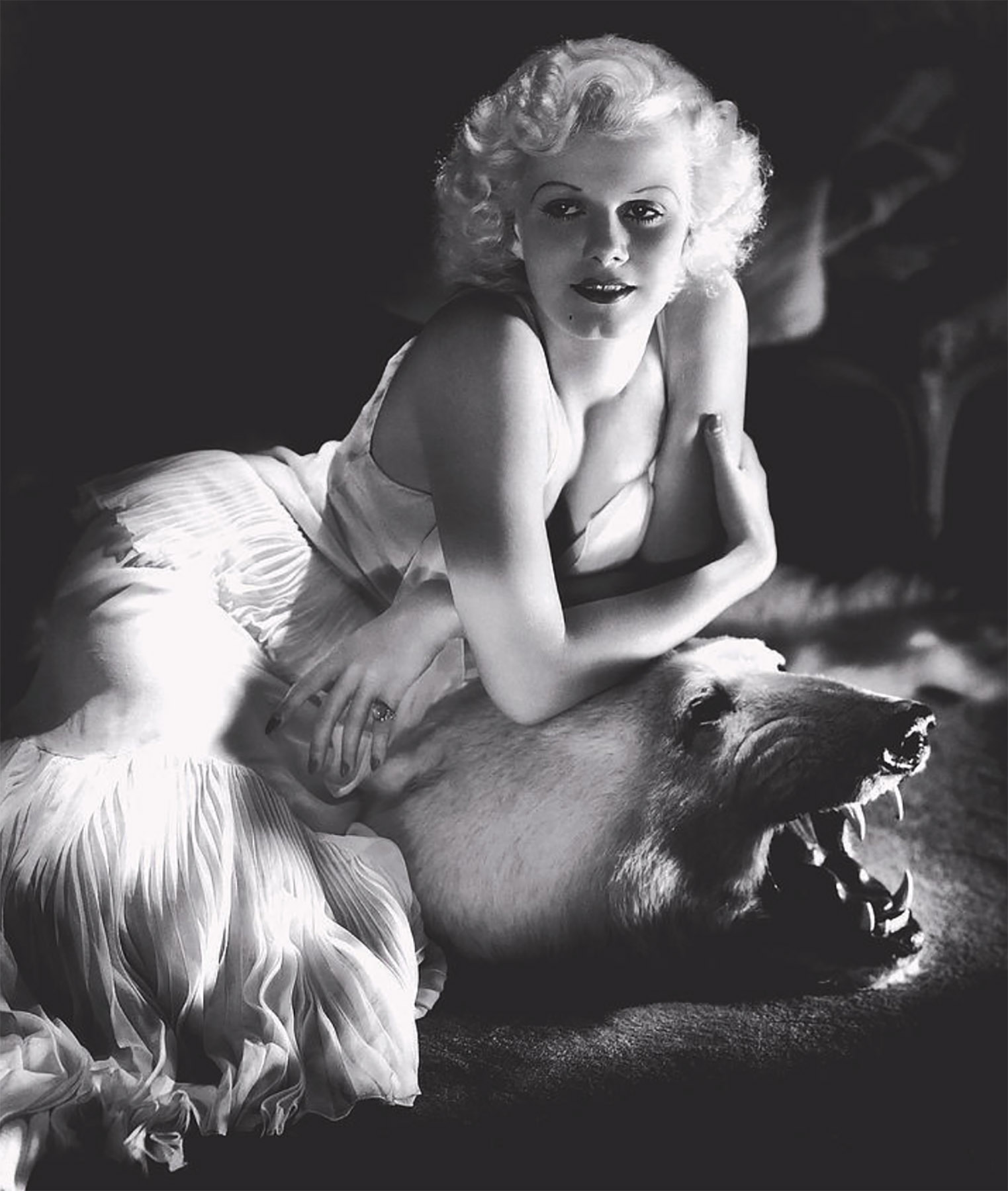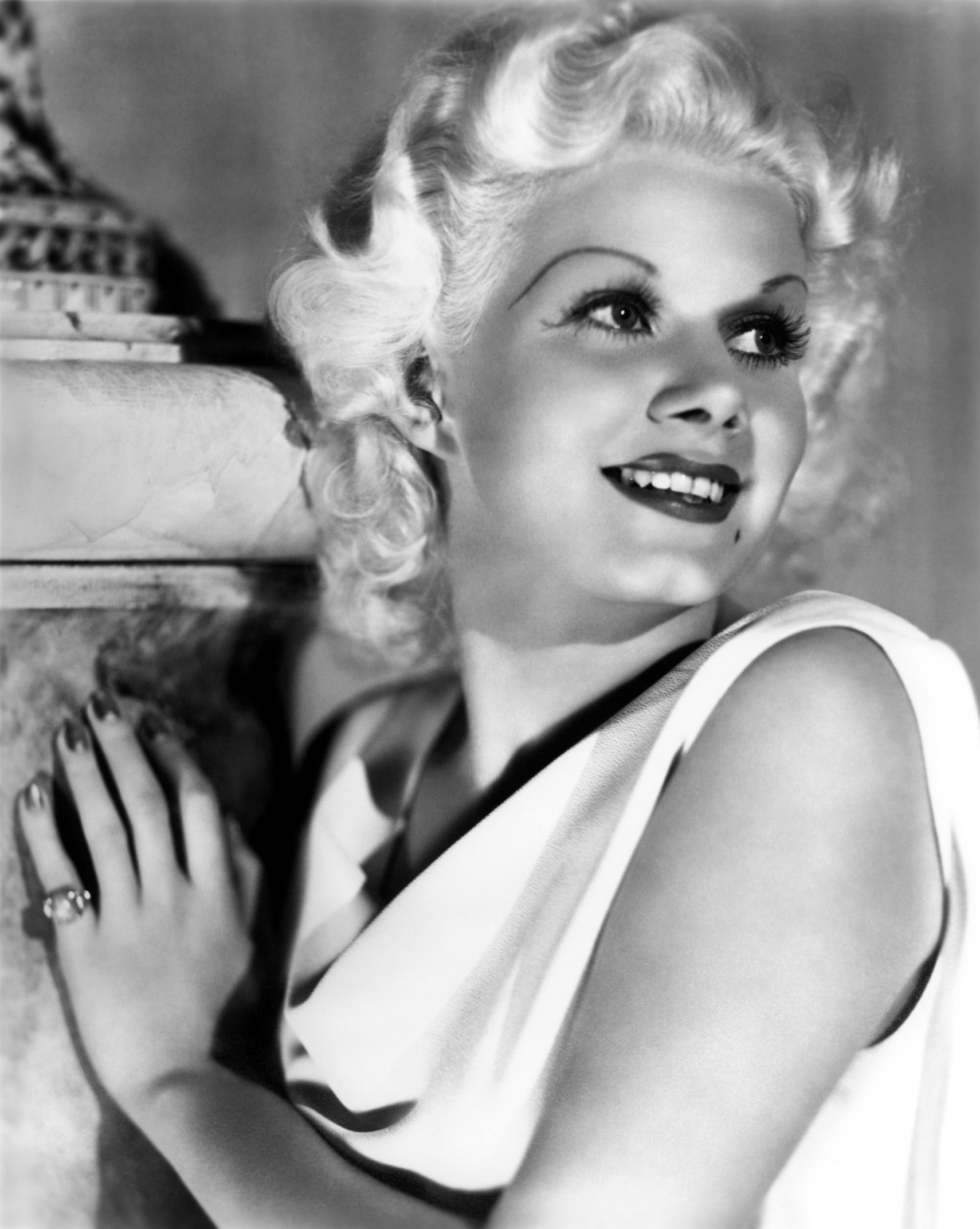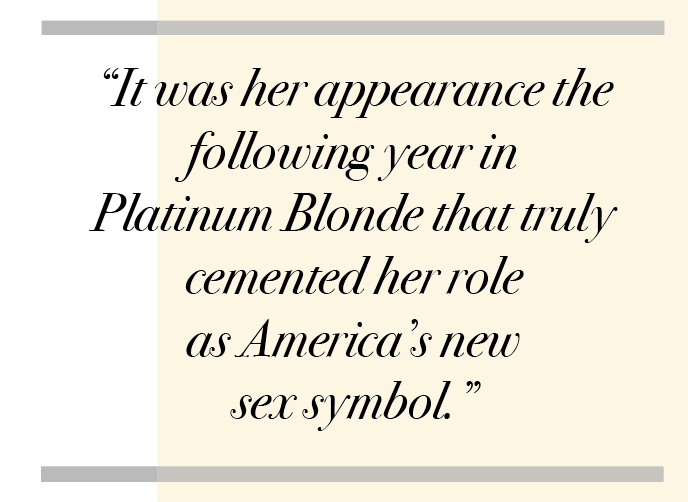The Golden Era – Hollywood’s Original Blonde Bombshell Jean Harlow

Editor in Chief Cece Woods considers herself the “accidental activist”.…
The golden era sex symbol’s rise to fame and her unusual relationship with New Jersey mobster Longy Zwillman that shocked Hollywood.
Born in Kansas City, Missouri on March 3, 1911, Harlean Carpenter, who the world would later come to know as Jean Harlow, became one of Hollywood ‘s first sex symbols.
Determined to carve out a life of her own, Harlean ran away from home at 16 years old to marry wealthy 23-year-old businessman, Charles McGrew. The couple lived off Charles’ rather large inheritance and shortly after they were married they moved to Beverly Hills.
In Los Angeles, Harlean found work as an extra in films and a year later, in 1928, she landed her first small role in the movie Moran of the Marines.
That same year, at 17 years old, Harlean was photographed nude in Griffith Park by Hollywood photographer Edward Bower Hesser. This quite possibly was the catalyst that led to more roles for the young would-be sex symbol.
By 1929 Harlean had small roles in no less than eleven movies. Unfortunately at that time, her marriage to McGrew was on the rocks and they would soon divorce. The marriage lasted barely two years.
It is believed that his drinking led to the divorce. However, if anything good came from the end of their marriage, it gave her the freedom to invest more in her acting career. It was shortly afterwards that Harlean adopted her new stage name, Jean Harlow.
Jean’s big break came in 1930 when she landed a stellar role in Howard Hughes’ 1930 WWI epic film Hell’s Angels, which turned out to be a box office hit. Not long after the film’s debut, Hughes sold her contract to MGM for $60,000 where her career rose to unprecedented heights. However, it was her appearance the following year in Platinum Blonde that truly cemented her role as America’s new sex symbol.

After the filming of Hell Angels, Jean was kept busy with publicity and did not appear in any films. Hughes made sure Jean was in the limelight by having her on a personal appearance tour and attending premieres. Subsequently, Paul Bern, an MGM producer, convinced Hughes to loan Jean out to his studio for the film The Secret Six.

In the 20’s and 30’s Hollywood “film factory” it was a very common practice for actors and actresses under contract to studios to churn out back-to-back films year after year. As a still young girl and somewhat novice actress trying to find her way in the industry, Jean started to become overwhelmed with the mad pace. Jean’s sex appeal was spreading throughout the country with the release of these films.
On one hand, her star power was being solidified with her fans, but she faced criticism because of this by the critics and the newspapers. Friends and colleagues remember Jean was truly unhappy and displeased with the unwanted and unflattering attention.

With all her film appearances maximized, Hughes gave Jean a rest from filming and sent her on a vacation, which in actuality turned out to be another personal appearance tour for the studio.
Although she disliked going on these personal appearance tours, Jean went as directed. Her stops included appearing at the Oriental Theater in Chicago of May, 1931, the Fisher Theater in Detroit and she continued to travel on the east coast until June, where she appeared in New York.
It was during one of the evenings at the Oriental Theater in Chicago where she met New Jersey mob boss Abner “Longy” Zwillman.
Jean had been married three times until this point. During the filming of Red Dust, Jean’s second husband of only two months, producer Paul Bern, committed suicide. Tongues were wagging over her well-known affair with actor William Powell, who later became the love of her life according to family and friends. However, it was her relationship with notorious mobster Longy Zwillman that shocked many.
Zwillman would soon take a liking to Harlow and although he was known to have a violent and homicidal history, by all accounts, he was a gentleman and women seemed to love him. Jean seemed to be fascinated by him and would turn to him when she was unhappy with her roles.
Zwillman grew up in Newark, New Jersey with very humble beginnings. At a young age, his father passed away forcing him to become the man of the house and support his family.
At 6’6”, Zwillman towered over many and with his fearsome reputation, he quickly gained the nick name “Longy”.
With his fiery temper, Zwillman fast became known as a defender in the neighborhood. Local Jewish pushcart peddlers were routinely harassed by area anti-Semites. When they were threatened, they would shout: “Get der langer!’ which translates to “Get the long one!” summoning Zwillman for help.
Zwillman would rise to become the undisputed mob boss earning his new title “the Al Capone of New Jersey.” Besides Meyer Lansky, Zwillman would be one of the most feared and respected members of the “Jewish Mafia” and was one of “The Big Six” (with Bugsy Siegel, Meyer Lansky, Lucky Luciano, Joey Adonis, and Frank Costello) and became one of the organizers and a founding member of the nationwide crime syndicate known as Murder Incorporated.
During Prohibition and height of his power, Zwillman controlled as much as 40% of all the liquor bootlegging in the country. He was a powerful mobster, but doing a much better job of flying under the radar as the other well-known members of The Big Six.
Zwillman and Jean would date briefly. He bestowed her with expensive gifts, among them a bracelet and a red Cadillac among other things. Coincidentally, or maybe not, during this time Jean received a two-picture deal plus a salary increase at Columbia Pictures. It is rumored that Zwillman loaned Columbia studios head Harry Cohn a $500,000 during that same time period.
On May 23, 1932 the contract between Howard Hughes’ Caddo Company and Columbia Pictures was signed, which lead to Jean’s two films Platinum Blonde and Three Wise Girls.

Ironically, Marino Bello, Jean’s stepfather, who was married for only a short time to Jean’s mother, was also a
gangster. Marino would go on to use his stepdaughter to ingratiate himself with gangsters.
While Zwillman did help advance Jean’s career, it was not all fun and games. Allegedly the FBI had Zwillman on tapes, making derogatory remarks about her to other mob associates and rumors circulated that Zwillman liked to give his pals lockets containing snips of her pubic hair as mementos. Why would Jean subject herself to such demeaning behavior? One can only assume that since Zwillman helped her succeed in her career, she was willing to take the verbal and private ridicule as the price to pay.

Wayne Clingman & Douglas Hess, Authors
Twitter @themilwakeemob, @hessdoug14
Read The Mafia in Hollywood: Hollywood is far from Disneyland
What's Your Reaction?
Editor in Chief Cece Woods considers herself the “accidental activist”. Having spent most her childhood on sands of Zuma Beach, Cece left Southern California in her early 20’s, but it was only a matter of time before she returned to the idyllic place that held so many wonderful memories from her youth. In 2006, she made the journey back to Malibu permanently, the passion to preserve it was ignited. In 2012, Cece became involved in local environmental and political activism at the urging of former husband Steve Woods, a resident for more than 4o years. Together, they were involved in many high-profile environmental battles including the Malibu Lagoon Restoration Project, Measure R, Measure W, and more. Cece founded influential print and online media publications, 90265 Magazine in 2013 highlighting the authentic Malibu lifestyle, and The Local Malibu, an online news media site with a strategic focus on environmental and political activism. In the summer of 2018, Cece broke multiple global stories including the law enforcement cover-up in the Malibu Creek State Park Shootings, and is considered by major news media as a trusted authority on Malibu.












